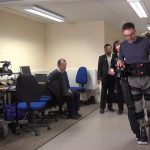 I’ve written a bit recently about advances in robotic prosthetics, with a team from Johns Hopkins developing robotic prosthetics that are capable of tapping into the brainwaves of its wearer.
I’ve written a bit recently about advances in robotic prosthetics, with a team from Johns Hopkins developing robotic prosthetics that are capable of tapping into the brainwaves of its wearer.
A team from the University of Kent are bringing these kind of robotic prosthetics out of the lab and into a real-world clinical trial.
Road-testing
The devices, which are designed to be ‘hands-free’, will be tested to see how they influence the freedom and behaviors of the patient, both in terms of their physical and emotional wellbeing.
The legs are capable of lifting the patient from a sitting position so that they can then engage in a range of walking and stretching exercises as designed by their physio team.
The idea is that it will be especially valuable for patients that are currently wheelchair bound and thus vulnerable to the kind of complications common with those who sit for prolonged periods. By being able to walk about with the support of the new legs, the team hope to both mitigate those risks whilst also improving the quality of life of the patient.
If these trials prove successful, the hope is that they will provide support for patients with a range of paralysis, whether they have suffered from injuries, strokes or motor neurone disease.
These initial UK trials will hopefully prove the case for the devices, and highlight both the range of applications plus the safety of using them so that patients aren’t at risk of falling. They will then team up with a manufacturing partner to bring them to market.
It’s undoubtedly a hugely valuable project, and hopefully the trials will proceed smoothly and they will soon be made available to paralyzed individuals the world over.